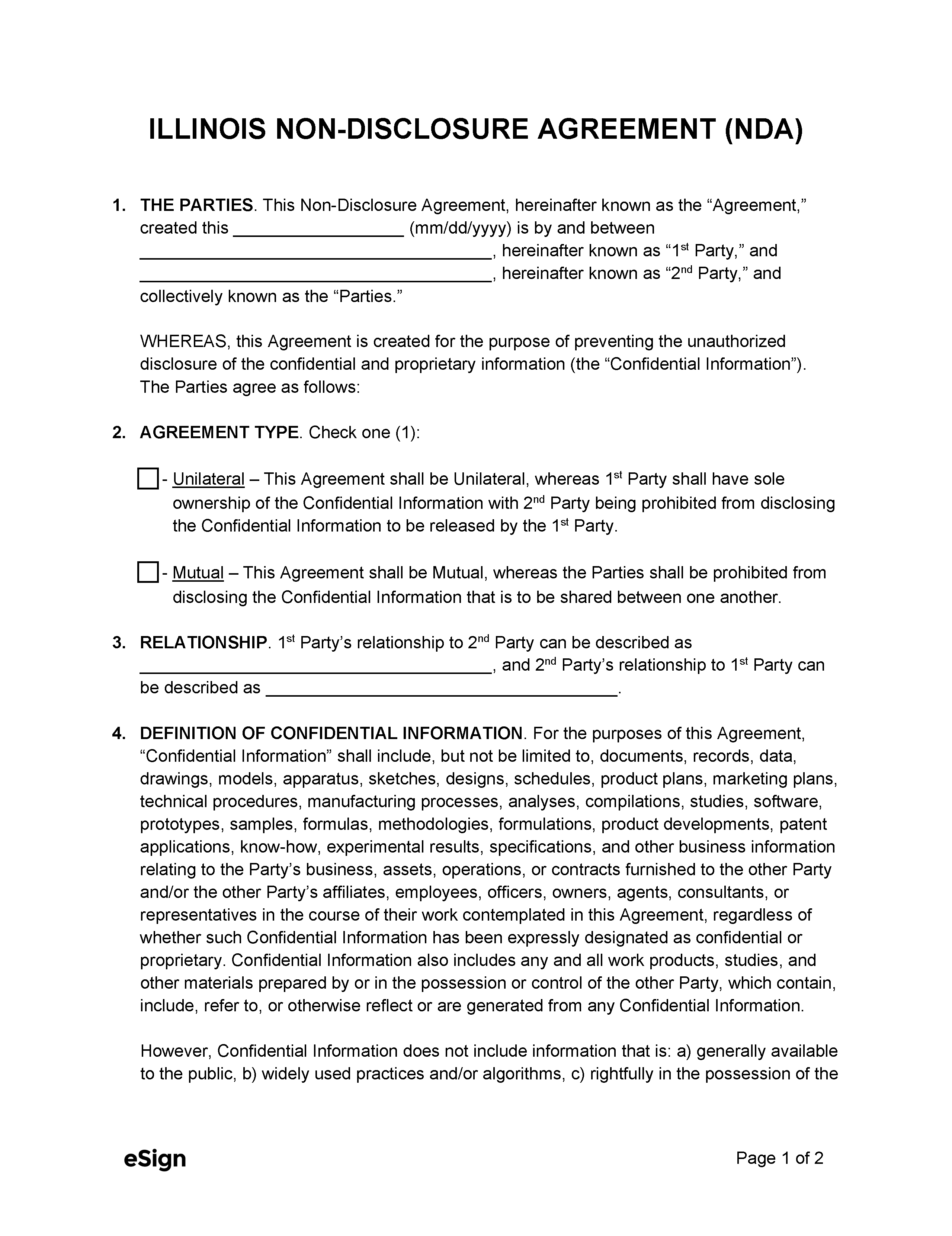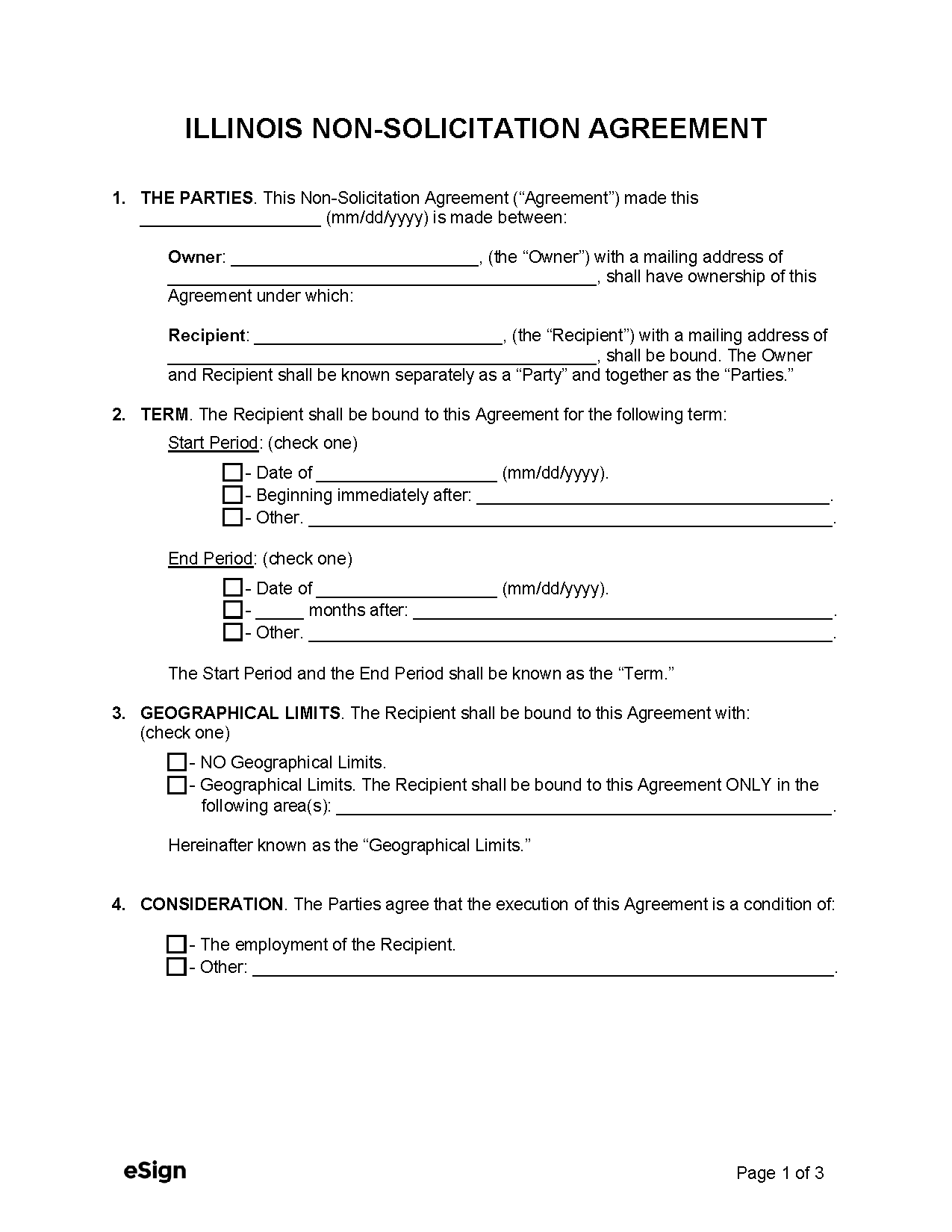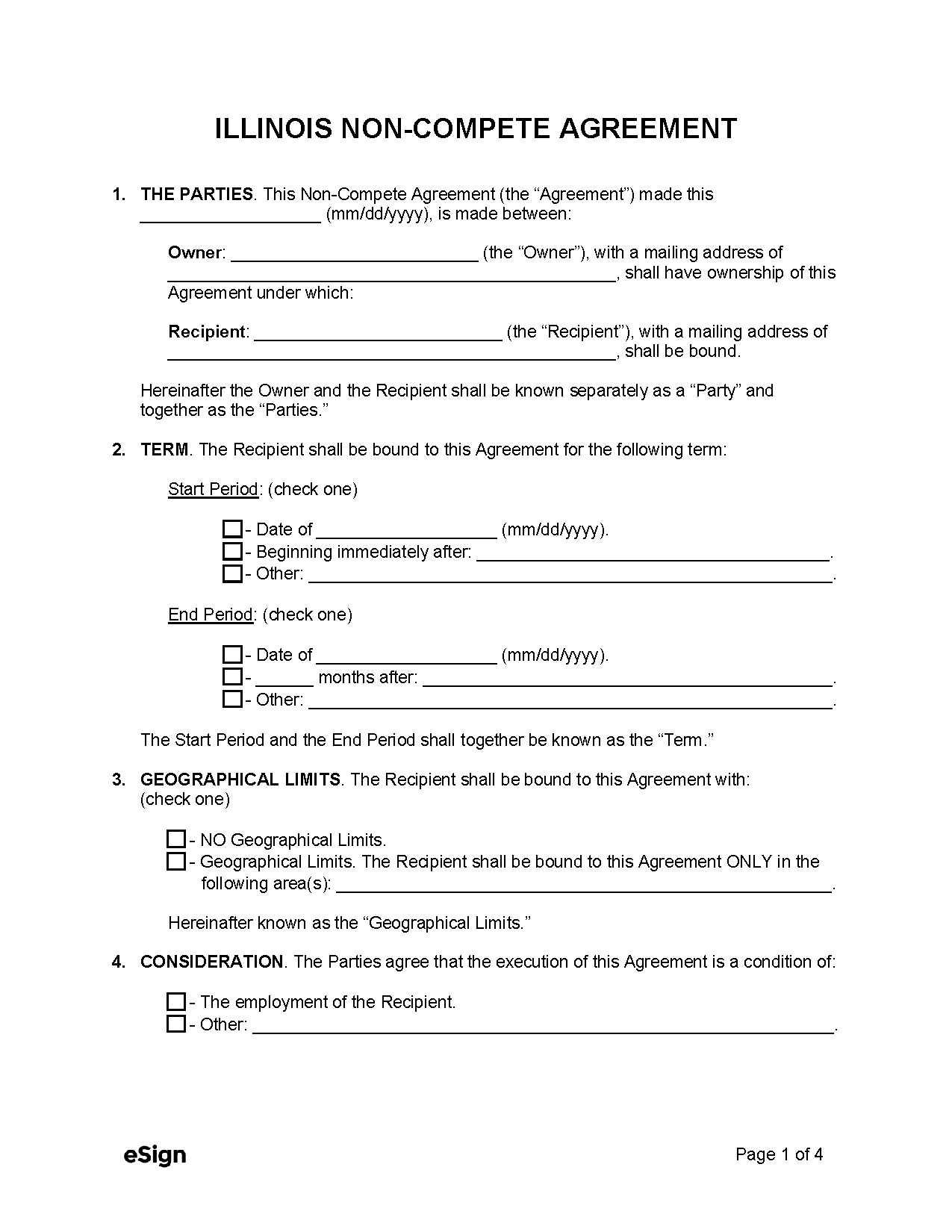Contents |
Enforceability in Illinois
Non-compete agreements are enforceable contracts in Illinois. State statutes specify numerous requirements that must be satisfied for a non-compete to be valid, as well as situations where non-competes cannot be employed.[1][2]
When it IS Enforceable
The statutes regulating non-competes state that an agreement will be invalid unless the arrangement:
- Involves sufficient consideration;
- Is ancillary to a valid employment contract.
- Is limited to protecting a legitimate business interest only;
- Does not cause undue hardship to the restricted party; and
- Is not harmful to the public.[3]
A copy of the non-compete must be given from the employer to the employee fourteen (14) days before they begin work or before the agreement’s execution. The employee must also receive a written notice stating that they have the right to consult with a lawyer before signing the agreement.[1]
When it’s NOT Enforceable
- Low-salary employees. It is prohibited to enforce a non-compete against an employee earning $75,000 a year or less.[4]
- COVID-19. Employees who lost their jobs due to the COVID-19 pandemic cannot be restricted by a non-compete.[5]
- Public Labor Relations Act/Educational Labor Relations Act. A non-compete agreement cannot be enforced against individuals who are parties to collective bargaining agreements under the Public Labor Relations Act or Educational Labor Relations Act.[6]
- Construction workers. Non-competes are unenforceable for construction workers (except those mainly involved in management, engineering, architecture, design, and sales or who are shareholders, partners, or owners).[6]
- Broadcasters. A restrictive covenant cannot be placed on broadcast industry employees.[7]
- Lawyers. A restriction on a lawyer’s ability to practice law is unenforceable. An exception applies to agreements concerning a lawyer’s retirement benefits.[8]
Maximum Time Period
State statutes do not impose a specific maximum time period for non-competes, and courts will consider whether the restriction’s duration is necessary for the employer’s protection on a case-by-case basis.[9] In the past, Illinois courts have upheld non-competes with durations of two (2) and five (5) years.[10][11]
Geographical Area
As with the other restrictions in a non-compete agreement, the area covered by the agreement cannot go beyond what is required to protect the employer’s business interests.[12] Courts will compare the agreement’s geographic scope to the area where the employer operates their business when assessing whether a geographic restriction is enforceable.[13]
Consideration
Illinois state law indicates that adequate consideration is at least two (2) years of employment after a non-compete is signed or work-related/monetary benefits (which can be provided in addition to employment or on its own).[14] In one case, consideration was defined as:
“Any act or promise that benefits one party or disadvantages the other is sufficient consideration to support the formation of a contract.“[15]
The Illinois Court of Appeals has stated that two (2) years of employment is the minimum for the contract to be enforceable.[16] By contrast, federal district court judges disagreed with this minimum requirement and have allowed shorter periods of employment as sufficient consideration.[17][18][19]
Sources
- 820 ILCS 90/15
- 820 ILCS 90/ Illinois Freedom to Work Act
- 820 ILCS 90/20
- 820 ILCS 90/10(a)
- 820 ILCS 90/10(c)
- 820 ILCS 90/10(d)
- 820 ILCS 17/10(a)
- IL R S CT RPC Rule 5.6
- 820 ILCS 90/7
- Millard Maint. Serv. Co. v. Bernero, 207 Ill. App. 3d 736, 749-50, 566 N.E.2d 379, 387-88 (1990)
- Mohanty v. St. John Heart Clinic, S.C., 225 Ill. 2d 52, 77-78, 866 N.E.2d 85, 99-100 (2006)
- AssuredPartners, Inc. v. Schmitt, 2015 IL App (1st) 141863, ¶35-36, 44 N.E.3d 463, 472-73 (2015)
- Cambridge Eng’g, Inc. v. Mercury Partners 90 BI, Inc., 378 Ill. App. 3d 437, 448, 879 N.E.2d 512, 522-23 (2007)
- 820 ILCS 90/5
- Bires v. Waltom, LLC, 662 F. Supp. 2d 1019, 1028 (N.D. Ill. 2009)
- Fifield v. Premier Dealer Servs., Inc., 2013 IL App (1st) 120327, ¶19, 993 N.E.2d 938, 943-44 (2013)
- Montel Aetnastak, Inc. v. Miessen, 998 F. Supp. 2d 694, 716 (N.D. Ill. 2014)
- Cumulus Radio Corp. v. Olson, 80 F. Supp. 3d 900, 909 (C.D. Ill. 2015)
- Stericycle, Inc. v. Simota, No. 16 C 4782, 2017 WL 4742197, at *5 (N.D. Ill. Oct. 20, 2017)
- Arpac Corp. v. Murray, 226 Ill. App. 3d 65, 79-80, 589 N.E.2d 640, 651-52 (1992)
- 820 ILCS 90/35
Related Forms (2)

Download: PDF, Word (.docx), OpenDocument

Download: PDF, Word (.docx), OpenDocument
